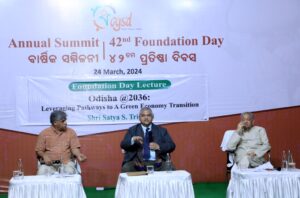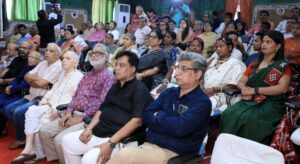Odisha @2036: Leveraging Pathways to a Green Economy Transition” Foundation Day Lecture @CYSD
The 42nd Foundation Day Lecture was delivered by *Shri Satya S Tripathi, the Secretary General of Global Alliance for a Sustainable Planet (GASP). Reflecting on his own journey, Shri Tripathi emphasised the importance of being driven by values rather than wealth or privilege. He expressed gratitude for the opportunities to represent his culture and community on the global stage, challenging the notion of labels while recognising the significance of his achievements as an Odia.
 His remarks resonated with humility and a profound sense of responsibility as he prepared to address the audience. With a focus on preparing Odisha for the challenges of 2036, he emphasised the need for collective action and innovative solutions to address the looming climate crisis.
His remarks resonated with humility and a profound sense of responsibility as he prepared to address the audience. With a focus on preparing Odisha for the challenges of 2036, he emphasised the need for collective action and innovative solutions to address the looming climate crisis.
In his address, he emphasised the historical significance of Odia culture, dating back to the Kalinga War in 262 BCE, where Kalinga remained unconquered. He highlighted the transformative power of the land, citing Emperor Ashoka’s change of heart following the war. The speaker urged the audience to recognise their roles as change-makers, guiding people towards positive transformations.
Shifting focus from problems to solutions, he addressed the global challenge of climate change, emphasising the interconnectedness of science, policy, and politics. He lamented the moral landscape of carbon emissions, where industrialised nations disproportionately contribute to global warming. He used the analogy of meal consumption to illustrate the disparity in carbon footprints between developed and developing countries, highlighting the unfair burden placed on nations like India.
He continued by highlighting the moral complexities surrounding climate action, particularly in the context of international negotiations and carbon emissions. He criticised the imbalance in responsibility between developed and developing nations, emphasising the unfair burden placed on countries like India. He illustrated this disparity using the analogy of a village with rich and poor households, where despite moral objections, practical necessity often requires cooperation with those in power.
Moving to the specifics of Odisha, he discussed the evolving carbon market and its potential impact on the state. He explained the concept of scope three emissions and how they will be factored into carbon pricing in the future. He cited examples of successful carbon reduction strategies, such as the Delhi Metro’s regenerative braking system, and highlighted the economic implications of carbon pricing for industries like natural farming in Odisha.
The lecture delved into the intricate details of carbon avoidance, mitigation, and sequestration, particularly in natural farming practices. He emphasised the importance of covering land throughout the year to retain moisture, thus reducing the need for irrigation and subsequent carbon emissions associated with electricity generation. He highlighted the potential benefits of transitioning to natural farming in Odisha, where vast cropland could sequester significant amounts of carbon annually, leading to improved prosperity for farmers.
Expanding his focus to the broader challenges faced by Odisha, he addressed the state’s carbon emissions and the implications of climate change on its coastal regions and agricultural productivity. He underscored the need for holistic solutions and emphasised the importance of community engagement in conservation efforts, citing successful projects in Indonesia as examples of collaborative, private-sector-led initiatives.
He concluded with a call to action, urging individuals to take responsibility for driving change and highlighting the potential for innovative solutions to address complex environmental issues. He emphasised the role of community-driven initiatives, such as the Master Farmer program, in promoting sustainable practices and empowering local farmers.
He emphasised the transformative impact of natural farming practices, particularly in improving public health and reducing the prevalence of diseases linked to chemical-based agriculture. He highlighted the success of bio-villages in Odisha and advocated for the recognition and financial compensation of women farmers for their contributions to carbon sequestration and societal well-being.
Addressing the need for behavioural and psychological changes, he stressed the urgency of acknowledging and addressing the accelerating degradation of the Earth’s ecosystem. He cited alarming trends such as the rapid melting of Arctic ice and the Himalayan cryosphere, emphasising the dire consequences for sea levels, water availability, and human civilization. He urged individuals to question consumption patterns and embrace sustainability, underscoring the importance of humility and collective action in safeguarding the planet for future generations.
 He underscored the urgency of halting destructive practices and embracing sustainable living to preserve Earth’s ecosystems. He recounted a meeting in the early 1980s where concerns about ecological degradation were raised, warning of dire consequences if natural resources were not managed responsibly.
He underscored the urgency of halting destructive practices and embracing sustainable living to preserve Earth’s ecosystems. He recounted a meeting in the early 1980s where concerns about ecological degradation were raised, warning of dire consequences if natural resources were not managed responsibly.
Addressing a query about pricing carbon in agricultural and coastal areas, he shared insights from a recent visit to Uttar Kanada district in Karnataka. There, efforts are underway to protect biodiverse wetlands by planting mangrove trees. Mangrove carbon, valued for its role in adaptation and carbon sequestration, offers multiple benefits in mitigating sea-level rise and minimising damage from natural disasters like tsunamis. He highlighted the potential for similar initiatives in Odisha, leveraging partnerships with global corporations to fund mangrove restoration projects.
Satya Tripathi’s Foundation Day lecture emphasised collective action and innovative solutions to combat climate change in Odisha. He highlighted the transformative impact of natural farming and urged recognition and compensation for women farmers. Tripathi underscored the urgency of addressing ecological degradation and advocated for sustainable living. His insights on pricing carbon and mangrove restoration projects offered practical pathways for environmental conservation.
————————————————————-
(*) The Speaker, Satya S Tripathy is a distinguished development economist, lawyer, and change-maker with over four decades of experience. With a rich international background, including key roles at the UN as former Assistant Secretary General and Head of Environment Management Group, he brings valuable insights to the table. He has been instrumental in various initiatives, from post-war human rights investigations to facilitating climate finance partnerships. Despite encountering numerous change-makers worldwide, he stands out for his unwavering passion and dedication, especially in amplifying the voices of the marginalised. Currently, he is the Chancellor of KISS University, Odisha.
